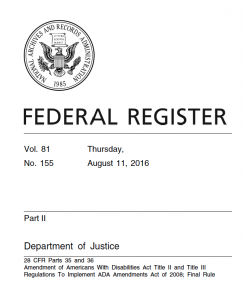 “Odd and Ends” is the title of a Bob Dylan concert compilation film that was recently released in digital format.³ My odds and ends are probably not as interesting, but I’ve been busy for the last month litigating claims under the FHA and ADA, so this blog is part one of a two part effort to catch up. I’m hoping to release a “greatest hits” blog in the near future.
“Odd and Ends” is the title of a Bob Dylan concert compilation film that was recently released in digital format.³ My odds and ends are probably not as interesting, but I’ve been busy for the last month litigating claims under the FHA and ADA, so this blog is part one of a two part effort to catch up. I’m hoping to release a “greatest hits” blog in the near future.
Pursuit of Respect keeps sending demands
I’ve gotten a dozen calls in the last few weeks from businesses in Pennsylvania, California and Florida who got demand letters from one attorney or another claiming to represent Pursuit of Respect. When I last checked none of those lawyers had filed a lawsuit, which I believe is because their client is fictitious and they’d rather not expose themselves to any kind of judicial inquiry. They will, however, keep harassing businesses that don’t respond with calls and additional letters. If anyone reading this knows of a lawsuit filed on behalf of POR I would be very interested in hearing about.¹ More


 Readers of my blog will recall that Republican efforts in the last few years to reform the ADA not only failed to pass, but also failed to address the real problems in enforcement of Title III.¹ An effort by Democrats is now part of the “Biden Plan for Full Participation and Equality for People with Disabilities.” The “Disabled Access Credit Expansion Act,” was introduced in 2019 bill by a group of Democratic Senators. The proposed legislation will make some very modest improvements in the ADA, but like its Republican counterpart mostly serves to point out deficiencies in the ADA that require far more aggressive action on behalf of small businesses and those with disabilities who continue to suffer from a lack of access to those businesses.
Readers of my blog will recall that Republican efforts in the last few years to reform the ADA not only failed to pass, but also failed to address the real problems in enforcement of Title III.¹ An effort by Democrats is now part of the “Biden Plan for Full Participation and Equality for People with Disabilities.” The “Disabled Access Credit Expansion Act,” was introduced in 2019 bill by a group of Democratic Senators. The proposed legislation will make some very modest improvements in the ADA, but like its Republican counterpart mostly serves to point out deficiencies in the ADA that require far more aggressive action on behalf of small businesses and those with disabilities who continue to suffer from a lack of access to those businesses. 

